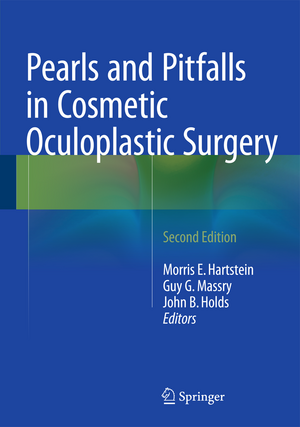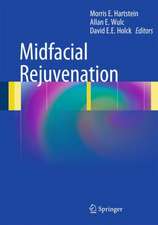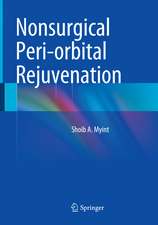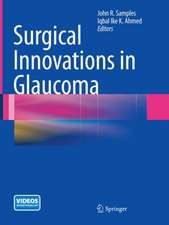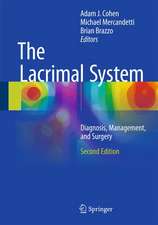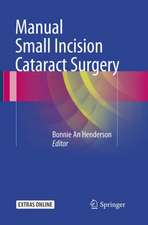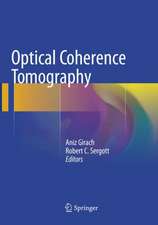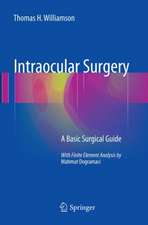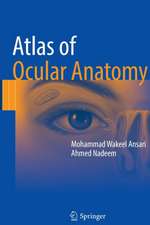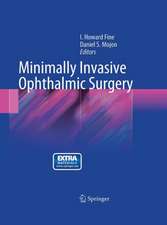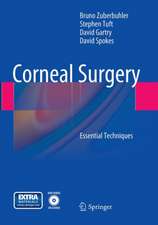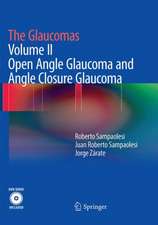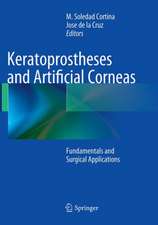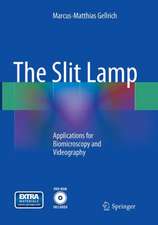Pearls and Pitfalls in Cosmetic Oculoplastic Surgery
Editat de Morris E. Hartstein, MD, FACS, Guy G. Massry, MD, FACS, John B. Holds, MD, FACSen Limba Engleză Hardback – 11 dec 2014
| Toate formatele și edițiile | Preț | Express |
|---|---|---|
| Paperback (1) | 1047.03 lei 39-44 zile | |
| Springer – 10 sep 2016 | 1047.03 lei 39-44 zile | |
| Hardback (1) | 1486.93 lei 39-44 zile | |
| Springer – 11 dec 2014 | 1486.93 lei 39-44 zile |
Preț: 1486.93 lei
Preț vechi: 1565.18 lei
-5% Nou
Puncte Express: 2230
Preț estimativ în valută:
284.56€ • 296.71$ • 236.49£
284.56€ • 296.71$ • 236.49£
Carte tipărită la comandă
Livrare economică 17-22 martie
Preluare comenzi: 021 569.72.76
Specificații
ISBN-13: 9781493915439
ISBN-10: 1493915436
Pagini: 715
Ilustrații: XXXVII, 715 p. 440 illus., 23 illus. in color.
Dimensiuni: 178 x 254 x 40 mm
Greutate: 1.79 kg
Ediția:2nd ed. 2015
Editura: Springer
Colecția Springer
Locul publicării:New York, NY, United States
ISBN-10: 1493915436
Pagini: 715
Ilustrații: XXXVII, 715 p. 440 illus., 23 illus. in color.
Dimensiuni: 178 x 254 x 40 mm
Greutate: 1.79 kg
Ediția:2nd ed. 2015
Editura: Springer
Colecția Springer
Locul publicării:New York, NY, United States
Public țintă
Professional/practitionerCuprins
Part 1: Preoperative Evaluation;Ch. 1: Preoperative Evaluation of the Cosmetic Patient;Ch. 2: Evaluation of the Cosmetic Patient; Ch. 3: Preoperative Patient Counseling for Cosmetic Blepharoplasty; Part 2: Anesthesia; Ch. 4: Cosmetic Oculofacial Pearls to Live By; Ch. 5: Guide to Local Anesthetic Medications; Ch. 6: Motor Nerve Blocks in Oculofacial Surgery; Ch. 7: Regional Nerve Blocks in Oculofacial Surgery; Oculofacial Surgery; Ch. 9: Preoperative Preparation and Anesthesia in Blepharoplasty; Ch. 10: “Digital Diffusion” Technique for the Administration of Local Anesthetic in Eyelid Surgery; Ch. 11: Anesthesia for In-Office Oculoplastic Surgery: How We Do It; Ch. 12: Pain Reduction Using Vibration in Aesthetic injections and in eye and facial plastic surgery; Ch. 13: Tips for Safer, More Effective, and More Comfortable Periocular Anesthetic Injections and Sedation; Part 3: Upper Lid Blepharoplasty; Section 1: Preoperative Evaluation; Ch. 14: Upper Eyelid Blepharoplasty: The Evaluation; Ch. 15: Preoperative Examination Checklist for Upper BlepharoplastyCh. 16: Preoperative Evaluation and Documentation in Upper Blepharoplasty; Ch. 17: Ten Tips to Avoid the Perils, Pitfalls and Complications of Cosmetic Blepharoplasty; Section 2: Incision Planning; Ch. 18: Marking Strategies for Upper Blepharoplasty; Ch. 19: Orbit Size and Lid Marking in Upper Blepharoplasty; Ch. 20: Incisional Guidelines When Marking the Skin in Upper Eyelid Blepharoplasty; Ch. 21: Marking the Proposed Upper Eyelid Crease: Determining the Safe Amount of Skin Removal—The Pinch Technique; Ch. 22: Preoperative Measurements in Upper Blepharoplasty: Patient Selection; Ch. 23: Keys to Success When Marking the Skin in Upper Blepharoplasty; Ch. 24: Skin Marking in Upper Blepharoplasty—Avoiding Pitfalls; Section 3: Upper Blepharoplasty Procedure Pearls; Ch. 25: A simple method for more efficient blepharoplasty surgery; Ch. 26: Upper Blepharoplasty: Pearls for the Procedure; Ch. 27: Blepharoplasty Pearls: General Tips; Ch. 28: Fat Excision in Upper Blepharoplasty; Ch. 29: Mobilizing and Excising the Nasal Fat Pad in Upper Blepharoplasty; Ch. 30: The Sigmoid Upper Lid Blepharoplasty; Ch. 31: Tissue Removal Considerations in Blepharoplasty Surgery; Ch. 32: Fewer Hematomas in Upper Blepharoplasty; Ch. 33: Blepharoplasty Incisional Modalities: 4.0 Radiowave Surgery vs. CO2 Laser; Ch. 34: Doing Safe Upper Blepharoplasty Surgery: When Less is Better; Ch. 35: Upper Blepharoplasty Pearls; Ch. 36: Fat Preservation and Other Tips for Upper Blepharoplasty; Ch. 37: Upper Eyelid Fat Repositioning; Ch. 38: Asian Blepharoplasty; Ch. 39: Upper Lid Blepharoplasty in the Asian Patient; Ch. 40: Recognizing the Differences in Asian Eyelid Anatomy; Section 4: Adjunctive Procedures in Upper Blepharoplasty; Ch. 41: Transblepharoplasty Internal Brow Elevation with Corrugator Removal; Ch. 42: Transblepharoplasty Incision LowerEyelid Canthoplasty; Section 5: Wound Closure and Postoperative Care; Ch. 43: Avoiding Dog Ears During Upper Blepharoplasty Closure; Ch. 44: Crease Formation in Upper Blepharoplasty; Ch. 45: Use of Dermabond Tissue Adhesive for Oculoplastic Incision Closure; Ch. 46: Reducing Postoperative Swelling; Ch. 47: Management of Postblepharoplasty Dry Eye; Ch. 48: Bump Thermoplasty for Small Benign Eyelid Lesions and Wound Artifacts; Ch. 49: Scar Management; Part 4: Lower Lid Blepharoplasty; Section 1: Preoperative Considerations; Ch. 50: Lower Eyelid Blepharoplasty: The Evaluation; Ch. 51: Lower Eyelid Blepharoplasty Evaluation: Avoid the Cookie Cutter Approach; Section 2: Lower Blepharoplasty Procedure Pearls; Ch. 52: Lower Eyelid Blepharoplasty: Procedure Pearls and Pitfalls; Ch. 53: Lower Lid Blepharoplasty: Transcutaneous verses transconjunctival approach; Ch. 54: Incising the Septum over the Nasal, Central, and Lateral Fat Pads in Lower Blepharoplasty; Ch. 55: Prolapsing the Inferior Fat Pads and Fornix in Lower Blepharoplasty; Ch. 56: Identifying the Inferior Oblique in Transconjunctival Blepharoplasty; Ch. 57: The ”GRED (Globe Retropulsion and Eyelid Depression)” Maneuver to Access Post-septal Fat in Transconjunctival Lower Blepharoplasty; Ch. 58: Achieving Symmetry in Lower Blepharoplasty Fat Removal; Ch. 59: The Treatment of Festoons in Lower Blepharoplasty; Ch. 60: Step by step treatment of post blepharoplasty chemosis; Ch. 61: Chemosis: Avoidance and Management Tips; Ch. 62: Making Lower Eyelid Transconjunctival Blepharoplasty Easier, Safer, and More Comfortable; Ch. 63: Management of Severe Postoperative Bleeding with Hemostatic Matrix; Section 3: Repositioning in Lower Blepharoplasty; Ch. 64: Fat Repositioning in Lower Blepharoplasty: Less Is More; Ch. 65: Fat Repositioning in Lower Blepharoplasty: Does the Plane of Fat Transposition Affect The Outcome?; Ch. 66: Transconjunctival Lower Lid Blepharoplasty with and Without Fat Repositioning; Ch. 67: Fat Pedicle Isolation During Transconjucntival Lower Blepharoplasty With Fat Repositioning: “The Inverse Shoe Shine Sign”; Ch. 68: Transconjunctival Pre-periosteal Fat Repositioning Blepharoplasty; Ch. 69: Lower Lid Blepharoplasty with Fat Repositioning Using a Foam Bolster; Ch. 70: Use of Tisseel in Lower Eyelid Blepharoplasty with Fat Repositioning; Ch. 71: Lower Blepharoplasty with Non-Suture Fat Repositioning; Ch. 72: The Bustier Lower Lid Blepharoplasty; Ch. 73: Lower blepharoplasty: Lift and Fill; Section 4: Management of Postblepharoplasty Lid Retraction; Ch. 74: Managing Postblepharoplasty Lower Eyelid Malposition; Ch. 75: Retroauricular Dermal Spacer Graft for Lower Lid Retraction Repair; Ch. 76: Mid-Lower Eyelid Tarsoconjunctival Flap-Skin Graft: Treatment of Cicatricial Lower Lid Retraction; Ch. 77: Treatment of Postblepharoplasty Lower Eyelid Retraction with Dermis Fat Spacer Grafting; Ch. 78: Lateral CanthalWebs; Ch. 79: True Lower Eyelid Retractor Recession as an Adjunct to Lower Lid Recession Surgery; Part 5: Forehead Rejuvenation; Section 1: Preoperative Considerations; Ch. 80: Which Browlift to Do?; Ch. 81: Browlifting: Patient Evaluation; Ch. 82: Preoperative Botox for Endoscopic Browlifting; Ch. 83: Forehead and Eyebrow Anatomy and its Continuity with the Eyelid; Section 2: Endoscopic Forehead Rejuvenation; Ch. 84: Five Tips for Endoscopic Browlift; Ch. 85: Anesthesia Options in Endoscopic Forehead Lifting; Ch. 86: Endoscopic Forehead Rejuvenation: How to Set Up the Operating Room and Trouble Shooting; Ch. 87: Endoscopic Forehead Rejuvenation: Equipment and Setup; Ch. 88: Incision Technique for Endoscopic Forehead Elevation; Ch. 89: Endoscopic Forehead Elevation: Patient Marking and Preparation; Ch. 90: Endoscopic Midforehead Techniques: Improved Outcomes with Decreased Operative Time and Cost; Ch. 91: Fifteen Principles of Enhanced Successin Endoscopic Browlift; Ch. 92: Dissection of Central Forehead and Temporal Pocket with Periosteal Release; Ch. 93: Endoscopic Forehead Lifting: Dealing with the Central Brow Depressors; Ch. 94: Elevation and Fixation of the Lateral Brow and Canthus; Ch. 95: Fixation Methods in Endoscopic Browlifting; Ch. 96: Endoscopic Browlift with Deep Temporal Fixation Only; Ch. 97: Tridimensional Brow, Glabella, and Temple Enhancement with Micro Fat Injection During Endoscopic Forehead Rejuvenation; Ch. 98: Scalp Fixation in Endoscopic Browlift; Ch. 99: Closing and Dressing the Wounds in Endoscopic Browlift; Ch. 100: Endoscopic Forehead Rejuvenation: Avoiding and Managing Complications; Section 3: Nonendoscopic Browlifting; Ch. 101: The Direct Browlift: Focus on the Tail; Ch. 102: Soft Tissue Augmentation of the Temporal Brow in Browlifting Surgery; Ch. 103: In-Office Brow and Forehead Lifting By A Quick Multi-Incision Trichophytic Approach; Ch. 105: The external browpexy: A minimally invasive brow lifting or stabilization procedure; Part 6: Mid-Face Lift; Ch. 106: Mid-Face Lift: General Considerations and How I Do It; Ch. 107: Ten Rules for Mid-Face Lifting for the Repair of Lid Retraction; Ch. 108: The Subperiosteal Mid-Face Lift Using Bioabsorbable Implants for Fixation; Ch. 109: Cheeklifting Pearls; Ch. 110: Preperiosteal Midface Lift Through Transtemporal Approach; Ch. 111: Maintaining Lateral Wound and Canthal Regularity in External Midface Lifts; Ch. 112: Cheek Implants; Part 7: Botox; Ch. 113: Introduction to Botulinum Toxin; Ch. 114: Evaluating Potential Patients for Neurotoxin; Ch. 115: Neurotoxin: General Principles of Treatment; Ch. 116: Botox: Where It Works Best; Ch. 117: Preparation of Botox; Ch. 118: Documentation of Treatment: Botox; Ch. 119: Botulinum Toxin Injection Technique; Ch. 120: Cosmetic Botulinum Toxin Applications: General Considerations and Dosing; Ch. 121: Botulinum Toxin: Avoiding Pitfalls; Ch. 122: Botox Injection Techniques: Minimizing Bruising and Discomfort; Ch. 123: Botulinum Toxin Injections Pearls; Ch. 124: Botox Complications; Ch. 125: Glabella Treatment with Neurotoxin; Ch. 126: Corrugator and Procerus Rhytid Treatment with Botox; Ch. 127: Frontalis Injection with Botox; Ch. 128: Frontalis Treatment with Neurotoxin; Ch. 129: Shaping of the Eyebrows with Botulinum Toxin Type A (BoNT-A; Ch. 130: Botox Injection Techniques: Crow’s Feet; Ch. 131: Orbicularis Oculi Treatment with Neurotoxin; Ch. 132: Perioral Botox Injectionsh. 133: Botulinum Toxin Type A Cosmetic: How to Achieve Precise and Predictable Results; Ch. 134: Botox Injection to the Lacrimal Gland for the Treatment of Epiphora; Ch. 135: Botox Therapy for Hyperhydrosis: How I Do It; Ch. 136: Other Uses of Botulinum Toxins; Ch. 137: Botox for Axillary Hyperhydrosis; Ch. 138: Use of Incobotulinum toxin A (Xeomin) for cosmetic facial rejuvenation; Ch. 139: Management of Benign Essential Blepharospasm; Part 8: Fillers; Ch. 140: Optimizing Outcome from Facial Cosmetic Injections and Promoting Realistic Expectations; Ch. 141: Pearls and Pitfalls of Injectable Facial Fillers; Ch. 142: Table of Fillers; Ch. 143: Dermal Filler Pearls: The Hyaluronic Acids; Ch. 144: Radiesse® Pearls: General Tips for Safer, More Comfortable, and Better Results; Ch. 145: Belotero Pearls; Ch. 146: Hyaluronic Acid Pearls: Fine and Superficial Lines; Ch. 147: Achieving Beautiful Lip Augmentation; Ch. 148: Restylane Injection for the Lower Eyelid Tear Trough; Ch. 149: Liquid Injectable Silicone for the Upper Third of the Face; Ch. 150: Periocular Injectables with Hyaluronic Acid and Polymethyl Methacrylate using microcannulas; Ch. 151: Novel Uses for Hydroxylapatite (Radiesse®) Filler: Beyond the Facial Folds; Ch. 152: Pearls and Pitfalls of Botox and Filler Substances in the Upper Third of the Face; Ch. 153: Lower Eyelid Rejuvenation: A Pictorial Management Guide; Ch. 154: Upper Eyelid Volumization with Hyaluronic Acid; Ch. 155: Correcting the upper eyelid hollow with filler; Ch. 156: Pearls for Periorbital Fat Transfer; Ch. 157: Volumetric Rejuvenation of the Tear Trough with fat transfer to Ristow’s space; Ch. 158: Complementary Fat Grafting in the Periorbital Region; Ch. 159: Autogenous Orbicularis and Fat as a Filler; Part 9: Skin Rejuvenation; Section 1: Skin Care; Ch. 160: Skin Care 101: The Basics; Ch. 161: Retinoids for the Cosmetic Patient; Ch. 162: Evaluation of Skin Lesions in the Cosmetic Patient Made Simple: Actinic Keratosis; Section 2: Nonablative Therapy; Ch. 163: Chemical Peels for Facial Rejuvenation; Ch. 164: Nonablative Laser and Light Facial Rejuvenation; Section 3: Ablative Therapy; Ch. 165: Ablative resurfacing-general considerations; Ch. 166: CO2 Laser Skin Resurfacing Prophylaxis; Ch. 167: CO2 Laser Resurfacing Immediate Postoperative Care Prior to Complete Epithelialization; Ch. 168: Products Used in CO2 Laser Resurfacing Wound Care: Late Postoperative Care After Complete Epithelialization; Ch. 169: Ablative Fractional Laser Skin Resurfacing; Ch. 170: Fractionated CO2 Laser Skin Resurfacing; Ch. 171: Monopolar Radiofrequency Tissue Tightening; Ch. 172: Dual-Mode Erbium-YAG Laser Skin Resurfacing; Ch. 173: Fraxel Treatment; Part 10: Other Cosmetic Procedures; Ch. 174: Repair of the Torn Earlobe; Ch. 175: Upper Lip Lift: a Powerful Rejuvenative Procedure; Ch. 176: Ten Tips for a Reliable and Predictable Deep Plane Facial Rhytidectomy; Ch. 177: Facelifting in the Full Neck; Ch. 178: Assessment and Treatment of the Aging Jaw Line; Ch. 179: Masseteric Facial Anastomosis for Dynamic Lower Eyelid Reanimation in Facial Paralysis; Part 11: Functional Lid Malpositions; Section 1: Ptosis- Anterior Approach; Ch. 180: Advantages of Sequential Versus Simultaneous Bilateral Levator Advancement Surgery; Ch. 181: Considerations in Simultaneous vs. Sequential Bilateral Levator Repair; Ch. 182: Ten Steps to Making External Levator Ptosis Surgery More Predictable; Ch. 183: Adjustable Suture Technique for Levator Surgery; Ch. 184: Tarsal Switch Levator Resection for the Treatment of Myopathic Blepharoptosis; Ch. 185: Modified Levator Advancement Ptosis Technique; Ch. 186: Minimally Invasive Ptosis Repair; Ch. 187: Small Incision External Levator Repair; Ch. 188: Levator Aponeurotic Dehiscence: A Pictorial Review; Ch. 189: Ptosis Repair by a Single-Stitch Levator Advancement; Ch. 190: Postoperative Care for Dry Eye Prevention in Ptosis Surgery; Section 2: Ptosis- Posterior Approach; Ch. 191: Pearls for Müller’s Muscle–Conjunctival Resection–Ptosis Procedure Combined with Upper Blepharoplasty; Ch. 192: Müller’s Muscle-Conjunctival Resection Pearls: Phenylephrine and Resection Considerations; Ch. 193: Avoiding Lid Contour Abnormalities in Müller’s Muscle-Conjunctival Resection: Recognizing the Lateral Shift; Ch. 194: Müller’s Muscle–Conjunctival Resection Procedure Tips; Section 3: Entropion; Ch. 195: Minimally Invasive, Three-Step, Transconjunctival Entropion Repair; Ch. 196: Entropion Repair by Pre-tarsal Orbicularis Transposition; Ch. 197: Simple “Bedside” Cautery Entropion Repair; Section 4: Ectropion; Ch. 198: “Simple-Dimple” Lateral Tarsus Fixation; Ch. 199: Simplified Lower Lid Tightening Without a Tarsal Strip; Ch. 200: Technique for Medical Canthal Flap to Correct Lid Retraction/Medial Ectropion; Ch. 201: Medial Canthorraphy; Ch. 202: Myocutaneous Flaps and Canthopexy for Repair of Severe Cicatricial Ectropion; Ch. 203: Internal Vertical Mattress Eyelid Reconstruction
Recenzii
“The book covers all aspects of cosmetic oculoplastic surgery very thoroughly. … This text will find its place in many a physician’s armamentarium of references. It should be of use to those who would like to increase their knowledge of the nuances of procedures used in the periocular area. For those who already feel skilled in such procedures, it does provide interesting and helpful ‘pearls’ that make one consider different approaches to various problems.” (Ted Wojno, Aesthetic Surgery Journal, Vol. 36 (2), 2016)
Notă biografică
Morris E. Hartstein, MD, FACS Department of Ophthalmology and Division of Plastic Surgery, Saint Louis University School of Medicine, , Director, Eye Plastics, Assaf Harofeh Medical Center, Zerifin, Israel
Guy G. Massry, MD, Spaulding Cosmetic Surgery, 120 South Spaulding Drive,Suite 315Beverly Hills, Ca 90212
John B Holds, MD,FACS, Professor, Department of Ophthalmology and Otolaryngology, Saint Louis University School of Medicine 12990 Manchester Road, Suite 102, St. Louis, MO 63131
Guy G. Massry, MD, Spaulding Cosmetic Surgery, 120 South Spaulding Drive,Suite 315Beverly Hills, Ca 90212
John B Holds, MD,FACS, Professor, Department of Ophthalmology and Otolaryngology, Saint Louis University School of Medicine 12990 Manchester Road, Suite 102, St. Louis, MO 63131
Textul de pe ultima copertă
Pearls and Pitfalls in Cosmetic Oculoplastic
Surgery, Second Edition addresses the need
among surgeons for cleanly distilled and clinically
relevant information. The second edition
of this popular text highlights the changes
and updates to the ever expanding field of
facial cosmetic surgery. There are updates
regarding the advances, for example in blepharoplasty
techniques, fillers and filler techniques,
periorbital fat grafting, brow lifting
techniques, and midface rejuvenation. Additionally,
nearly every chapter has full color
illustrations to bring each one to life.
This concise and practical “how to” book is
written and edited by experts in their fields
and offers “here’s how I do it” advice on the
most commonly performed procedures. Each
chapter becomes the voice of an expert and
experienced colleague, reminding readers of
the pearls and pitfalls of each procedure.
These pearls will lead to more efficient techniques,
fewer complications, and enhance
outcomes for physicians and their patients.
Surgery, Second Edition addresses the need
among surgeons for cleanly distilled and clinically
relevant information. The second edition
of this popular text highlights the changes
and updates to the ever expanding field of
facial cosmetic surgery. There are updates
regarding the advances, for example in blepharoplasty
techniques, fillers and filler techniques,
periorbital fat grafting, brow lifting
techniques, and midface rejuvenation. Additionally,
nearly every chapter has full color
illustrations to bring each one to life.
This concise and practical “how to” book is
written and edited by experts in their fields
and offers “here’s how I do it” advice on the
most commonly performed procedures. Each
chapter becomes the voice of an expert and
experienced colleague, reminding readers of
the pearls and pitfalls of each procedure.
These pearls will lead to more efficient techniques,
fewer complications, and enhance
outcomes for physicians and their patients.
Caracteristici
Addresses the need among physicians for cleanly distilled and clinically relevant information on the field of facial cosmetic surgery Updates to popular topics such as advances in blepharoplasty techniques, advances in brow lifting techniques, and advances in midface rejuvenation Each chapter, complete with color illustrations, serves as the voice of an expert, reminding readers of the pearls and pitfalls of each procedure Includes videos of various procedures on Springer Images
